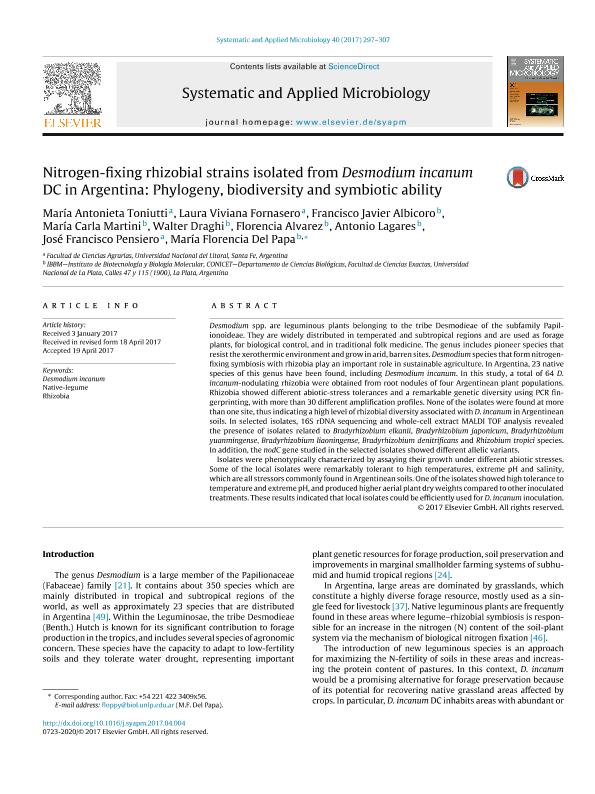Artículo
Nitrogen-fixing rhizobial strains isolated from Desmodium incanum DC in Argentina: Phylogeny, biodiversity and symbiotic ability
Toniutti, Maria Antonieta; Fornasero, Laura Viviana; Albicoro, Francisco Javier ; Martini, María Carla
; Martini, María Carla ; Draghi, Walter Omar
; Draghi, Walter Omar ; Alvarez, Florencia
; Alvarez, Florencia ; Lagares, Antonio
; Lagares, Antonio ; Pensiero, Jose Francisco
; Pensiero, Jose Francisco ; del Papa, Maria Florencia
; del Papa, Maria Florencia
 ; Martini, María Carla
; Martini, María Carla ; Draghi, Walter Omar
; Draghi, Walter Omar ; Alvarez, Florencia
; Alvarez, Florencia ; Lagares, Antonio
; Lagares, Antonio ; Pensiero, Jose Francisco
; Pensiero, Jose Francisco ; del Papa, Maria Florencia
; del Papa, Maria Florencia
Fecha de publicación:
07/2017
Editorial:
Elsevier Gmbh
Revista:
Systematic And Applied Microbiology
ISSN:
0723-2020
Idioma:
Inglés
Tipo de recurso:
Artículo publicado
Resumen
Desmodium spp. are leguminous plants belonging to the tribe Desmodieae of the subfamily Papilionoideae. They are widely distributed in temperated and subtropical regions and are used as forage plants, for biological control, and in traditional folk medicine. The genus includes pioneer species that resist the xerothermic environment and grow in arid, barren sites. Desmodium species that form nitrogen-fixing symbiosis with rhizobia play an important role in sustainable agriculture. In Argentina, 23 native species of this genus have been found, including Desmodium incanum. In this study, a total of 64 D. incanum-nodulating rhizobia were obtained from root nodules of four Argentinean plant populations. Rhizobia showed different abiotic-stress tolerances and a remarkable genetic diversity using PCR fingerprinting, with more than 30 different amplification profiles. None of the isolates were found at more than one site, thus indicating a high level of rhizobial diversity associated with D. incanum in Argentinean soils. In selected isolates, 16S rDNA sequencing and whole-cell extract MALDI TOF analysis revealed the presence of isolates related to Bradyrhizobium elkanii, Bradyrhizobium japonicum, Bradyrhizobium yuanmingense, Bradyrhizobium liaoningense, Bradyrhizobium denitrificans and Rhizobium tropici species. In addition, the nodC gene studied in the selected isolates showed different allelic variants. Isolates were phenotypically characterized by assaying their growth under different abiotic stresses. Some of the local isolates were remarkably tolerant to high temperatures, extreme pH and salinity, which are all stressors commonly found in Argentinean soils. One of the isolates showed high tolerance to temperature and extreme pH, and produced higher aerial plant dry weights compared to other inoculated treatments. These results indicated that local isolates could be efficiently used for D. incanum inoculation.
Palabras clave:
Desmodium Incanum
,
Native-Legume
,
Rhizobia
Archivos asociados
Licencia
Identificadores
Colecciones
Articulos(CCT - SANTA FE)
Articulos de CTRO.CIENTIFICO TECNOL.CONICET - SANTA FE
Articulos de CTRO.CIENTIFICO TECNOL.CONICET - SANTA FE
Articulos(IBBM)
Articulos de INST.DE BIOTECNOLOGIA Y BIOLOGIA MOLECULAR
Articulos de INST.DE BIOTECNOLOGIA Y BIOLOGIA MOLECULAR
Articulos(INBA)
Articulos de INST.DE INVEST. EN BIOCIENCIAS AGRICOLAS Y AMBIENTALES
Articulos de INST.DE INVEST. EN BIOCIENCIAS AGRICOLAS Y AMBIENTALES
Citación
Toniutti, Maria Antonieta; Fornasero, Laura Viviana; Albicoro, Francisco Javier; Martini, María Carla; Draghi, Walter Omar; et al.; Nitrogen-fixing rhizobial strains isolated from Desmodium incanum DC in Argentina: Phylogeny, biodiversity and symbiotic ability; Elsevier Gmbh; Systematic And Applied Microbiology; 40; 5; 7-2017; 297-307
Compartir
Altmétricas



